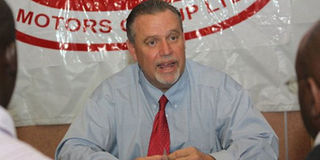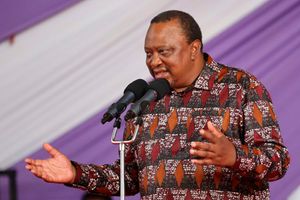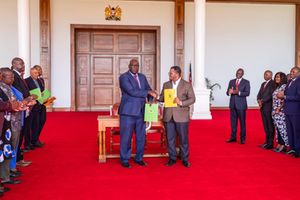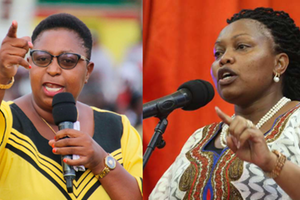How motor firm bosses stashed away Sh255m in secret accounts

"Prior to joining CMC... I had also heard rumours that friends of the previous GMD Martin Forster were paid salary bonuses via offshore accounts” CMC managing director, Bill Lay. Photo/FILE
At 82 years of age, Mr Jeremiah Gitau Kiereini’s illustrious career in government and business was supposed to have a happy ending.
But then, at the wrong moment, two rival groups of five newly-rich men and fellow directors who would traditionally be expected kiss his ring as the chairman of the CMC Motors board decided to start airing their dirty linen in public.
Then he was caught in the cross-fire.
It was humiliating enough that in a March board meeting, these men had worked in cahoots to kick him out of the board together with Mr Martin Forster, who had served as the group managing director. Together, they had served the 67-year-old company for many years.
However, documents reviewed by the Sunday Nation dating back to 1996 reveal that Mr Kiereini and Mr Forster have been sitting on deep secrets of their own — worth more than £1.7 million or Sh255 million at one point last year.
The existence of this money has never been revealed neither in the annual financial statements that the company sends out to its shareholders on the Nairobi Stock Exchange nor in the books it maintains for the taxman. (Read: Judge drops order on CMC over ‘conflict of interest’)
The money was accumulated by colluding with suppliers to overcharge CMC on invoices. The monies would be paid back to the two along with other employees over the last 26 years.
For instance, in March 2011, Mr Kiereini was paid £5,000 (Sh750,000), Mr Forster £18,500 (Sh2.8m) and similar amounts in September.
Since 2008, payment schedules reveal that Mr Kiereini received £20,000 (Sh3m) and Mr Forster got £77,750 (Sh11.7m). The money was not taxed.
CMC saga
Although Mr Kiereini had approached the Sunday Nation for a meeting to “put facts straight” on the CMC saga, he postponed the meeting and did not respond to further requests for an interview.
The big question now is how Mr Kiereini, the patriarch of Kenya’s high society, corporate chieftain, and a man who rose the career ladder whispering into the ears of three presidents got ensnared into a two-decade web of offshore money laundering.
Why would a wealthy man who owns major shares in CMC risk so much for such small amounts?
Official documents, including audited accounts and disbursement schedules, reveal that, in the last 20 years, Mr Kiereini and Mr Forster have operated three secret offshore trust accounts which funds were built by adding half a percentage point to the invoiced cost of every car purchased from Jaguar Land Rover and Nissan UD. The two dealerships were at one point the rainmakers for the company.
During Presidents Kenyatta and Moi’s eras, Land Rover was the official face of government transport when the British were the favourites.
Nissan Diesel, manufactured by UD Trucks of Japan, remains a popular lorry brand on Kenyan roads.
According to people familiar with the details, this is how the plan worked out.
CMC would order Land Rover and Nissan Diesel vehicles and strike a particular price negotiated at arms-length.
This is the legitimate contract price that would go to the British and Japanese manufacturers.
They would than ask the manufacturer to pad the bill by half per cent and present this as the full invoice to CMC Kenya.
According to a letter dated October 5, 1999 from Mr Forster to Mr Stan Lewis, the linkman in Cyprus – a tax haven – the commissions arrangement was done through two trading companies which had offices in Nairobi. One of these trading companies was Nissho Iwai company.
The padded amount would be routed into an investment trust account and the payments would trickle back into the pockets of Mr Kiereini, Mr Forster and, by 2010, 11 other employees, including Mr Greg Forster, the latter’s son.
In 2008, 17 people were regular beneficiaries. These payments would be made through a side arrangement established through a complex web of transactions that are typically designed by tax lawyers and accountants to hide money from tax authorities.
Some rich people use these offshore investment trusts for legitimate tax and estate planning as a way of ensuring that much of their wealth is passed on to their children.
In the case of CMC, these executives operated three trust funds, namely: The Fair Valley established in Jersey and Corival formed in 1996, and CMC Group Limited, incorporated on December 22, 1999 in the British Virgin Islands, another tax haven.
It is not clear when Fair Valley was established, but there is correspondence referring to it in 1996.
However, if such a secret offshore trust fund was in existence before 1996, players in the motor industry say it would have been a common business practice during the foreign currency control regime.
During those days, companies maintained a foreign bank account through which manufacturers would remit the money they give franchise holders for marketing and logistic support and this would be used to fund foreign purchases to go around the limitations of currency shortages that were typical in Kenya.
However, most companies closed these accounts after Kenya ended currency controls in 1993 in favour of an open market system. These arrangements were not used for tax evasion.
But, in CMC’s case, the company seems to have gone a long way in cheating both the tax authorities and its shareholders.
The details of the secret deals at CMC came to light by accident on Monday, May 2, the day Mr William Lay reported to work as the new managing director.
Among the symbols of power that the boss of CMC gets is a huge bunch of 20 or so keys and a private bathroom in his office.
The bunch contains a key to the green safe located in the bathroom. That is where all the secrets were hidden.
On the day Mr Lay reported, he got curious about the safe. He did not expect much, though he was aware of the humiliating way Mr Forster had been walked out of the office by a group of directors led by Mr Peter Muthoka and Mr Paul Ndung’u on the day they fired him.
They had supervised as he vacated the office to make sure he did not take anything they felt was useful.
When Mr Lay opened the safe, he was shocked by how empty it was.
One of the two green files in the safe had a yellow stick-on note in Mr Forster’s handwriting that said, “upon my demise please give this to the group chairman [Mr Kiereini]”.
In a memo to the board dated September 18, 2011, Mr Lay says “around” May 10, Mr Forster called him requesting for a meeting to “review debtors and a few ‘other’ issues”.
“Prior to joining CMC I had heard rumours that customers received kickbacks and commissions from offshore bank accounts. I had also heard rumours that friends of the previous GMD Martin Forster were paid salary bonuses via offshore accounts. I had discounted these stores until I received a call from MHF,” Mr Lay recounts in the memo.
“When I met Martin, he casually mentioned that Jack Benzimra (the long-time managing director who left office in 1995) had established an account in Jersey to look after the welfare of past, present and future CMC staff members. He said the fund was established in 1999 by over-invoicing from Jaguar Land Rover and Nissan UD of 0.05 per cent for a number of years and the contributions were curtailed a few years ago.”
The balance in one of these accounts, according to financial statements reviewed by Sunday Nation, stood at £1.7 million in 2009.
Mr Forster explained that a group of select employees, mostly senior managers and a few board members, were given salary top-ups twice a year, in March and September.
Indeed, Mr Forster, since he had been allowed to give a six-month notice until September 2011, had arranged for his final payment to be made.
For money to be paid, all it took was for the CMC managing director to contact Mr Paul Benzimra, a nephew of Jack Benzimra and the linkman to the Fair Valley Trust, with the details of who was to be paid and the amounts.
According to Mr Lay’s version of events, he had tricked Mr Forster into believing that as the new boss, he also wanted to start getting payments from the trust fund.
He agreed and arranged for a meeting with Mr Paul Benzimra. The meeting happened sometime in May at Sofitel, the luxury hotel located at London Heathrow Airport Terminal 5.
In an email dated June 8, 2011 to Mr Forster, Mr Benzimra recounts how glad he was that things were moving smoothly.
“Good to talk this a.m. and you appear to be getting closer to finalising things. Hope it works out with Bill as he will be key in making life more bearable going forward.”
He gave the name of Richard Schindler as the link to the trust that is now managed by RBC Trust Company.
Mr Lay says after he got the information, he informed Mr Forster that he was not interested in receiving payments and asked him (Mr Forster) and Mr Benzimra to make arrangements and close the trust and remit the cash to CMC.
“Martin took the opportunity to tell me that I should not discuss this account with anyone as the amounts paid to staff were not taxed.”
Employers are required to collect payroll tax on their employees’ salaries every month and, if they fail, the Kenya Revenue Authority can impose penalties.




